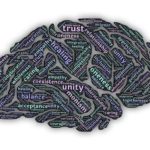Enhance Your Mind
Be mindful of your thoughts - feed your mind with positive words. Keep your brain hydrated with regular water intake.

Enhance Your Body
Be mindful of your intake - Feed your body with foods that nourish. Hydrate with water. Exercise regularly.

Enhance Your Soul
Be mindful of your soul/spirit - Take time to relax, meditate and/or be with nature to soothe your soul.

Morning Mind Health
Did you know that it is really important to drink water soon after waking up? The brain has a higher percentage of water than our body does, therefore it is essential to keep it hydrated. Especially after a night of sleep, the brain needs it's dose of water, otherwise it will shrink - literally! Your body will thank you for that glass of water too 🙂
Another morning benefit is to feed your mind with positive, uplifting words and feelings. This helps to set the scene for the day ahead. You may have heard that many successful people choose to meditate and use affirmations in the morning and/or just before going to sleep at night. At the time of waking, our brain is still a little "drousy" so to speak, but it's actually a great time to plant what you would like to cultivate. Although there are 5 brain frequencies, I will just touch on 4 at this time. When we're properly asleep our brain is in "delta" and when we're awake our brain is in "beta". In between these two stages are "theta" and "alpha". When we're sleeping very lightly or in the first stage of waking up, we're in theta and will go through alpha before being fully alert. The mind is most impressionable during these theta and alpha states. Choose thoughts, words and feelings with wisely.
Body Fuel
The saying "You are what you eat" isn't entirely true - we don't look like a plate or veges or a bag of chips. However, we do REFLECT what we eat, what we drink and what we do physically, in some way - whether that be now or in the future. There maybe some people who appear to "get away" with eating (and/or drinking) unhealthy as they don't gain weight, but what is visible is not the whole picture! Think about the reality of what is actually going on inside our bodies? (organs, cells, joints, etc). What is poor nutrition actually doing to the body?
Each person's body is unique - with it's own optimal functions, requirements and reactions to what it is being fed. However, keeping to the basics of simple and "clean" eating will suit most bodies.
Then there are some people who think that because they're not fat that they don't need to exercise. However, exercise is not only for people who aren't their ideal weight, exercise is essential for every body in many ways.
If you think of the body as a machine (which it kind of is), it makes sense to put the correct fuel into it and to maintain it well in order to have it run smoothly and last longer.
Soulful Living
Remember, that by taking care of your mind and body - the soul is getting it's dose of care too. The soul really loves to connect with nature. And it also likes the mind/body to feel calm, so a moment of relaxation with soothing music is one action that can be easily taken.

